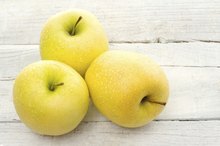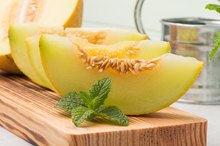Fruits That Are Natural Laxatives
Fruit is an excellent source of soluble and insoluble fiber, which acts as a natural laxative and helps to keep you regular. Fruit juice, fresh and dried fruit are all natural digestive aids that help prevent constipation and keep your digestive system functioning normally. The American Dietetic Association recommends getting at lease 20 grams to 35 grams of fiber daily. Adding fiber to your diet also helps reduce your risk for diabetes and heart disease.
Berries
Berries provide big fiber benefits and make good afternoon snacks. The fiber in these fruits have natural laxative effects, and they provide your body with an antioxidant boost from vitamin C, magnesium, potassium and phytochemicals. Cranberries and blueberries may even help prevent bladder infections, according to the National Institutes of Health. One cup of raspberries contains 8 grams of fiber, while blackberries contain around 7.6 grams of fiber per cup.
- Berries provide big fiber benefits and make good afternoon snacks.
- The fiber in these fruits have natural laxative effects, and they provide your body with an antioxidant boost from vitamin C, magnesium, potassium and phytochemicals.
Apples, Bananas, Plums and Oranges
What Are the Benefits of Apples, Oranges & Grapes?
Learn More
An average apple has 4.4 grams of fiber, a medium banana has 3.1 grams of fiber, oranges have 3.1 grams of fiber and pears have 5.5 grams. Besides the benefits of vitamins and minerals, these fruits contain insoluble fiber in their skins and soluble fiber in the fleshy part of the fruit. Insoluble fiber add bulk to waste products, helping them move quickly through your digestive system.
Apricots, Nectarines, Pineapples and Melon
Apricots contain 0.7 grams of fiber, nectarines have 2.3 grams of fiber, melon contains 1.4 grams of fiber per cup and pineapple has 2.2 grams of fiber per cup. The soluble fiber in these fruits helps to slow the passage of food through your intestines and helps lower your blood glucose, according to Colorado State University Extension.
Dried Fruits
How Many Calories in Carrot Sticks?
Learn More
Dried fruits are another source of dietary fiber that helps keep your digestive tract functioning normal. Three prunes contain 1.9 grams of fiber and one tablespoon of raisins contains 1 grams of fiber. Figs are a rich source of dietary fiber, with 10.5 g of fiber in a serving of three dried figs. Dried fruit can be added to other foods such as cereal and breads or can be eaten alone as a snack. Drink plenty of water to help your stools move through your digestive tract and keep your bowel movements normal. If you are increasing your total daily dietary intake of fiber, be sure to gradually increase the amount to reduce bloating and gas that may result.
- Dried fruits are another source of dietary fiber that helps keep your digestive tract functioning normal.
Related Articles
References
- Mayo Clinic: High-Fiber Foods; 11-17-09
- Continuum Health Partners: Dietary Fiber
- Dahl WJ, Stewart ML. Position of the Academy of Nutrition and Dietetics: Health Implications of Dietary Fiber. J Acad Nutr Diet. 2015 Nov;115(11):1861-70. doi: 10.1016/j.jand.2015.09.003.
- Francesca De Filippis, et.al. High-level adherence to a Mediterranean diet beneficially impacts the gut microbiota and associated metabolome. Gut, 2015; gutjnl-2015-309957 DOI: 10.1136/gutjnl-2015-309957
- Harvard School of Public Health. http://www.hsph.harvard.edu/nutritionsource/carbohydrates/fiber/
- University of Maryland Medical Center. http://umm.edu/health/medical/altmed/supplement/fiber
- USDA.http://www.ers.usda.gov/topics/
Writer Bio
Caroline Thompson is a professional photojournalist who has been working for print and online publications since 1999. Her work has appeared in the "Sacramento Bee," "People Magazine," "Newsweek" and other publications. She holds a Bachelor of Arts in photojournalism from California State University at Hayward and a personal trainer certification from the university's Health and Fitness Institute.








